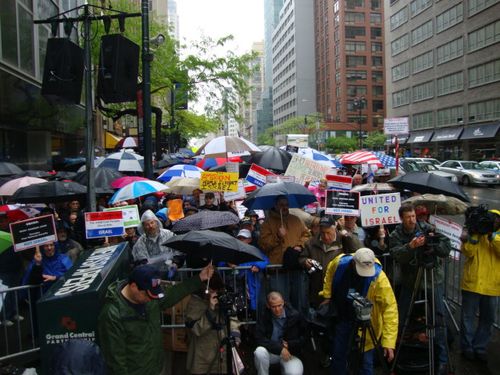The President is Not Omnipotent
This picture caught the eye of many people on the Internet. Besides the shooting of bin Laden, the location of Obama's seat was another highlight that overshadowed the news itself. It probably has to do with the differences between our cultures; seating the highest official in the corner conflicts with Chinese norms of seating by rank, regardless of the occasion.
There is nothing out of the ordinary in this. The president decides whether to take action or not. But coordinating or directing substantial military action is neither the president’s strength nor his responsibility, giving flexibility for his “people” to handle the situation in the supposed best way. It is no big deal for the president to either take a seat merely watching the process or even to go home and take a rest.
So if in this very moment the president doesn't play a main role, it is natural he does not occupy the seat with the greatest importance. However, if the president shows up in a place where he does not hold power and assumes an unnecessary responsibility, it will cause trouble — in mild cases it will draw attacks from the press; in serious cases the president will be called before Congress.
Not long ago, Obama was photographed in another picture. This May, Obama visited England and at the Globe Academy, he played table tennis with Prime Minister David Cameron, making a show of the good relationship between the two countries by playing against two 16-year-old students. Despite the great team morale, Obama and Cameron didn’t play in coordination at the table. After showing a series of pompous skills, they lost by 0 to 11. However, they didn’t reveal any regret on their face but helplessly accepted defeat with smiling faces.
This response is quite normal based on the result. As president and prime minister of their respective nations, Obama and Cameron are men in important positions; but in table tennis, this definitely brings them no advantage over two ping pong lovers. Being able to have fun and get closer to the people means that the goal of the outing has already been achieved.
Chinese people can take a special message from this news, compared with Chinese news reports. Playing with the students is a good way for the leaders to connect with the general public, no matter what happens in any country, because it will raise attention. However, if it had happened in China, losing is the last thing that the media would cover, not to mention a score of zero. The news report was probably far too ruthless in not hiding any details, but is it overly transparent? Perhaps because of these details, the news coverage of different countries varies based on audiences. At least in China, this would conflict with the prevailing culture.
On the other hand, those two students were too serious. These students probably didn’t get the school’s notice in advance when they played against such important people without giving them a chance to save face. If it had happened in China, this outcome would have been unlikely, at least not result in a zero-point loss.
Considering the similarity between these two pictures, it must be concluded that the president is not omnipotent. A president should avoid standing in the wrong place and should know when to and when not to intervene. One should admit one’s weaknesses. When the knowledge of those weaknesses does not exceed the normal framework of ideology and becomes common knowledge, everything will be naturalized and normalized.


